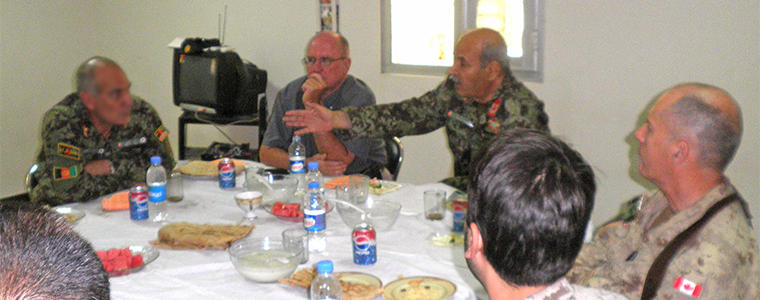The Future of USG Advising Missions
From Afghanistan to Iraq, Ukraine to Honduras, advising is a key U.S. strategy to address weak government capacity in sectors including finance, policing, education, agriculture, transportation, justice, and many others. Yet advising missions too often are hindered by challenges common across all U.S. government agencies. On January 5, USIP held a policy-level discussion about mission mandates for long-term, locally-owned solutions, the first in a series of conversations on advising as a means to provide foreign assistance and capacity building to partner countries.

Advising is increasingly understood to be the prevalent instrument for building long-term peace and stability. As U.S. government agencies deploy advisors to help build institutions and solve problems, mission plans become the foundation for effective capacity building.
USIP’s Academy for International Conflict Management and Peacebuilding has been at the forefront of the preparation of advisors for multifaceted missions in complex contexts. In early 2014 The Academy convened the Integrated Training for Advisors (ITAP) working group with the aim of increasing the effectiveness of USG advising missions. The working group has recently launched an initiative to discuss the future of USG advising missions in post-conflict environments. This event offered opportunities to U.S. agencies that deploy advisors to partner countries to reflect together with interagency colleagues on this very important and timely capability.
Agenda
9:00 | Welcome
Ambassador William B. Taylor
Acting President, United States Institute of Peace
9:10 | Keynote Address
What is the strategic value of advising programs and what is the role of policy in ensuring their effectiveness?
James Schear
Public Policy Scholar, Woodrow Wilson International Center for Scholars; former Deputy Assistant Secretary of Defense for Partnership Strategy and Stability Operations
9:25 | Panel Discussion (I): How can USG advising missions best contribute to host nation capacity?
Discussant: Nadia Gerspacher, Director, Security Sector Education, United States Institute of Peace
Respondents: representatives of:
- Office of Technical Assistance, US Department of the Treasury
- International Criminal Investigative Training Assistance Program (ICITAP), US Department of Justice
- Bureau of Counterterrorism, US Department of State
- Center for Excellence on Democracy, Human Rights and Governance (DRG Center), US Agency for International Development (USAID)
- Ministry of Defense Advisors (MoDA) Program, OSD Policy
10:15 | BREAK
10:30 | Panel Discussion (II): What changes are needed to maximize the sustainability of USG advising missions?
Discussant: Nadia Gerspacher, Director, Security Sector Education, United States Institute of Peace
Respondents: representatives of:
- International Criminal Investigative Training Assistance Program (ICITAP), US Department of Justice
- Center for Excellence on Democracy, Human Rights and Governance (DRG Center), US Agency for International Development (USAID)
- Ministry of Defense Advisors (MoDA) Program, Defense Security Cooperation Agency
11:15 | Summary, conclusions, and next steps



